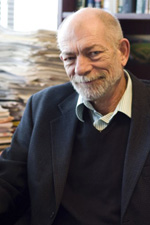 My office has two overflowing bookshelves, with more books stacked on top and on the windowsill. But above my desk within easy reach is a small shelf. On it I keep those books I most regularly use in thinking and writing. Here are the top 10.
My office has two overflowing bookshelves, with more books stacked on top and on the windowsill. But above my desk within easy reach is a small shelf. On it I keep those books I most regularly use in thinking and writing. Here are the top 10.
1. The Bible: What can I say about the foundational source of God's guidance in everything? I read or refer to it nearly every day. It was given to us "for teaching, for reproof, for correction, and for training in righteousness" (2 Timothy 3:16).
2. The Book of Common Prayer: I am not Anglican/Episcopalian, but there is something in the formal prayers of the traditional liturgy that resonate with my soul. On those days I really don't feel like praying or can't find the words, it's comforting to have a place to turn for inspiration.
3. The U.S. Constitution; and 4. The Federalist Papers: With all the voices today trying to tell us what the Constitution says and what the founders thought, it's important to go to the sources. What they actually said and thought is often quite different than the "strict constructionists" of today claim.
5. A Testament of Hope: The Essential Writings of Martin Luther King Jr., ed. James Washington: Dr. King's speaking and writing on the Christian struggle for justice is a frequently necessary resource in today's struggles. He lit the way for my lifelong commitment to the movement, and continues to provide guidance today.
6. The Christian Witness to the State, John Howard Yoder: A classic on the Christian role in politics, and one I still regularly use for reference. While we can never hope to hold the state accountable to the ethics of the kingdom of God, we can demand that it live up to its own professed standards.
7. Faithful Citizenship: A Catholic Call to Political Responsibility, U.S. Conference of Catholic Bishops; and 8. For the Health of the Nation: An Evangelical Call to Civic Responsibility, National Association of Evangelicals: Both of these resource provide principles for Christians engaged in public policy. The two resources are somewhat different in perspective, but surprisingly similar. Both are useful for guidance on today's issues and how to approach them from Christian principles.
9. Moral Grandeur and Spiritual Audacity, Abraham Joshua Heschel: The wisdom of a great prophet on faith and social action, prayer, and Jewish-Christian relations. His central teaching that God needs us to bring about justice grounds my belief in realizing that "The world is unredeemed and deficient, and God is in need of man to be a partner in completing, in aiding, in redeeming."
10. The Associated Press Stylebook: Personally, I like the New York Times style better, but Sojourners, like most publications other than the Times, uses AP. So, I go along, especially when proofreading.
How about you? What books are on your bookshelf? What books do you find yourself turning to again and again? Please share them with me in the comments section of this blog post.
Duane Shank is senior policy advisor at Sojourners.
Got something to say about what you're reading? We value your feedback!